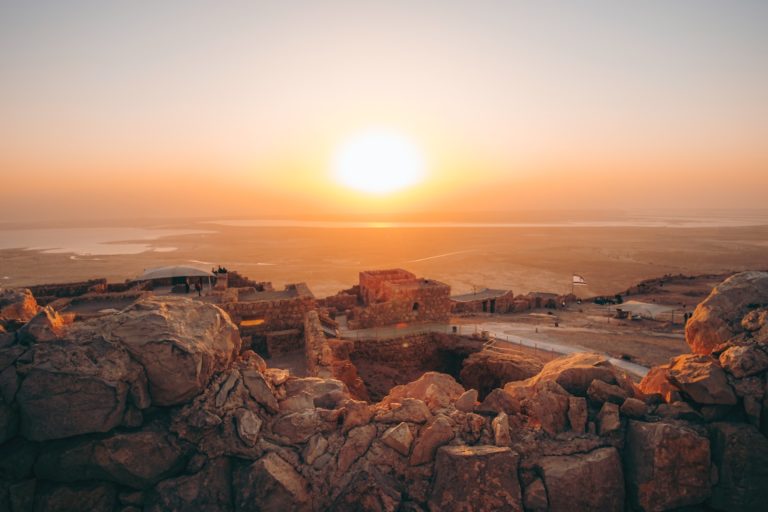
Ruth: Where Thou Goest, I Will Go (Part 1)
I’ve always admired Ruth. She was a woman of courage, willing to leave everything she had ever known for her mother-in-law Naomi’s sake. Naomi, her husband Elimelek, and their two sons Mahlon and Kilion had immigrated from Bethlehem, during a time of famine, to Moab, arch enemies of the Israelites.
Elimelek chose to leave the Promised Land which God had given to his people and to go live among idol-worshippers. While there, both of his sons married Moabite women, Ruth and Orpah.
Movies often cast Ruth as a priestess or servant in the temple of Chemosh, the god of the Moabites. It makes for a dramatic story, but the biblical record shows no indication of this. However, she likely grew up worshipping the idol. But somewhere along the way she married a young Jewish man, either Mahlon or Kilion, and her heart turned to the one true God.
Ten years later, Ruth’s husband died without the couple having any children. Her mother-in-law’s sorrow was even greater. She lost her husband and both sons, with no grandchildren to offer comfort and carry on the family line. Grief-stricken, Naomi determined to return to the land of her birth. After decades in a foreign land, she was returning home to Bethlehem, a poor widow, broken-hearted and bitter.
However, Orpah and Ruth loved her and insisted on immigrating with her. Naomi begged them to turn back for their own sakes. They would be foreigners in Bethlehem and not welcomed. In addition, they, very likely, would end up living the life of poor widows with no marriage prospects. Orpah relented and returned to Moab. Ruth did not. She was determined to stick by her mother-in-law no matter what.
I love her declaration to Naomi:
“Don’t urge me to leave you or to turn back from you. Where you go I will go, and where you stay I will stay. Your people will be my people and your God my God. Where you die I will die, and there I will be buried. May the Lord deal with me, be it ever so severely, if even death separates you and me.” Ruth 1: 16 – 17 NIV.
Ruth knew the meaning of the word “commitment” and lived it.
Once the two women reached Bethlehem, Ruth strove to provide for Naomi. She went to work as a gleaner in the barley fields.
This is where God’s providence can be seen. Naomi believed that God had forsaken her, that he had punished her and her husband for forsaking Israel for Moab. But upon her return, God worked through the events to provide for and bless both her and Ruth.
They “happened” to arrive in Bethlehem at the beginning of the harvest. The field that Ruth went to glean in “just happened” to belong to Boaz, a relative of Elimelek, and Boaz “just happened” to come riding by to inspect his fields on the morning that Ruth came there. Coincidence? No. God was at work to do exceedingly abundantly beyond what they dared ask for or dream of.
Boaz was a man of honor, who loved the Lord. Once he saw Ruth and learned who she was, he went over and above all expectations to make sure she was welcomed to his fields and given the best place behind his servants to glean, telling her to go to no other fields but his. He instructed his men to not harass her and to provide her with plenty of water to drink. He even invited her to dine with him that day and gave her extra barley to carry home. The image of a perfect gentleman. The verses state that he admired her dedication and faithfulness to Naomi. He’d heard how she’d given up everything to follow her mother-in-law. The Bible doesn’t say, but I’d like to think that he also liked her smile.
A godly man and a godly woman overflowing with mutual admiration. Tune in next week to see what God had in store.
Sources:
- Lawson Younger. Jr. The NIV Application Commentary. Judges/Ruth.
- Holy Bible, NIV.


5 thoughts on “Ruth: Where Thou Goest, I Will Go (Part 1)”
Ruth is a wonderful story! Thank you for sharing this.
Thank you for stopping by, Jack:) I love the story.
Ruth and Boaz are a wonderful type of Jesus, both showing His love and faithfulness. Thank you for sharing this, Sherry! 🙂
Yes, they are beautiful examples. And it’s cool to think that Ruth didn’t become one of God’s people by birth but by heart.
I love Ruth’s story too.:)
Comments are closed.